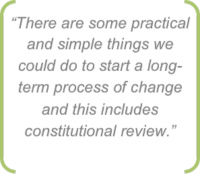

Anthony Cole
Anthony Cole is the kaihautu (Director) of the Centre for Postgraduate Studies, the Tāhuhu (Masters) teaching programme of Te Whare Wānanga o te Pīhopatanga o Aotearoa, one of New Zealand’s tertiary, Māori private training establishments. He has a broad range of research interests, including modelling complex systems, ecological restoration, whole-of-system accounting, indigenous transdisciplinary research, epistemology, classical history and religion.
What three issues facing youth today do you feel particularly strongly about?
I prefer to take a more transdisciplinary perspective on things and as such avoid trying to make generalisations. Our modern social, economic, political and environmental context suits some young people very well. For this group, I would say there would seem to be very few issues. In terms of education, opportunities for travel, employment and self-development the youth of today would be among the privileged of any generation. However, beyond this group and narrow range of success criteria there certainly are issues and/or concerns:
(i) Accessibility – our education system is efficiency oriented and thus targets the centre of the normal distribution curve in terms of youth ‘learning need’. This means that state-funded education does not ideally meet the learning needs of those sitting at the outer margins of the normal distribution spread, and this includes Māori, other cultural minorities and highly gifted students.
(ii) Economic participation – the dominant economic model of our time is designed to meet the employment and individual preferences of the cultural majority. Unfortunately, we have failed to recognise that cultural sustainability and survival is inextricably bound to culturally mediated models of economic organisation. It is, practically speaking, very difficult for Māori youth and those of other cultural minorities to participate in a model of economic organisation not grounded in their own cultural worldview (especially values) and identity.
(iii) Ecological duty of care – while we might argue that the youth of today are economically and technologically privileged, they have been born into and grown up in a generation that struggles to understand and appreciate the inextricable connection that exists between human and ecological wellbeing. With few exceptions, in this area we have been successful in passing on to our children a legacy of our own misguided values. While the youth of today are the generation of tomorrow, most lack the under-standing, skills, ethics or values and determination that will be needed to address the world’s looming ecological and resource management crisis.
What changes would you like to make to the way New Zealand is governed?
In New Zealand we have a saying that ‘we do not vote political parties in, we vote them out’. In other words we get sick of the party in power and then cast our vote in favour of the opposition, not because they are really any better but because they’re not as bad as what we are currently putting up with. New Zealand politics is like a pendulum that swings back and forth between options that are in reality ‘far-from-ideal’. The big question is ‘how do we change this?’
There are some practical and simple things we could do to start a long-term process of change and this includes constitutional review. First, we need to remove the current model of contestable funding we have in science so that academics in this country are uncoupled from the competitive, market-led funding and truly free to fulfil their role in providing critique, creativity, direction and orientation to society. Second, while there are clearly collective benefits in a democratic model of social organisation, we need to awaken to the realisation that we are ‘free’ to work out an implementation of democratic governance that works for us. If so, then why not do it! There is research going on all around the world at present looking at alternative models of governance based on power sharing, dialogue, empowering leadership and cultural mediation in governance etc.
Third, we need to recognise that governance is actually research. In the case of government, the only difference between scientists and politicians is that the former are required to publish their results and be held to account by members of a peer community for the validity of their assumptions and choice of research method etc. By contrast, we have modelled government on business management in which financial accountability is paramount, and position – i.e. CEO or Prime Minister – carries with it an assumption of superior explanation or argument. If governance is research then we need qualified researchers working full-time with politicians advising, recording and publishing. Finally, while we clearly celebrate the importance of individual preferences associated with consumer sovereignty, there are some areas in which our wellbeing and that of earth’s ecosystems are dependent upon collective values. Educators have a responsibility and role to play in preparing a future generation of voters who hold the requisite collective values that will make it possible for us to move our political system from the pendulum model we have at present, to a model in which we work together, we share, we trust and we collectively succeed in a way that is good for both human and ecological economies.
What actions, if any, are you planning to contribute to the constitutional review?
We are a relatively young nation and our current constitutional status reflects this fact. The terms of reference for the current review and commitment made by Ministers of the Crown to ensure that the review process is publicly driven means that this should be an opportunity for all New Zealanders to contribute to a national dialogue on this important matter. I’m planning to stay up to date with developments and to contribute in written form to the dialogue as it unfolds. Clearly, a review of this kind is an important opportunity to gauge public mood on the need for changes to our current model of governance. It will also provide an important opportunity to gauge current public mood on the role of the Treaty of Waitangi in any future written constitutional framework and/or arrangements.

